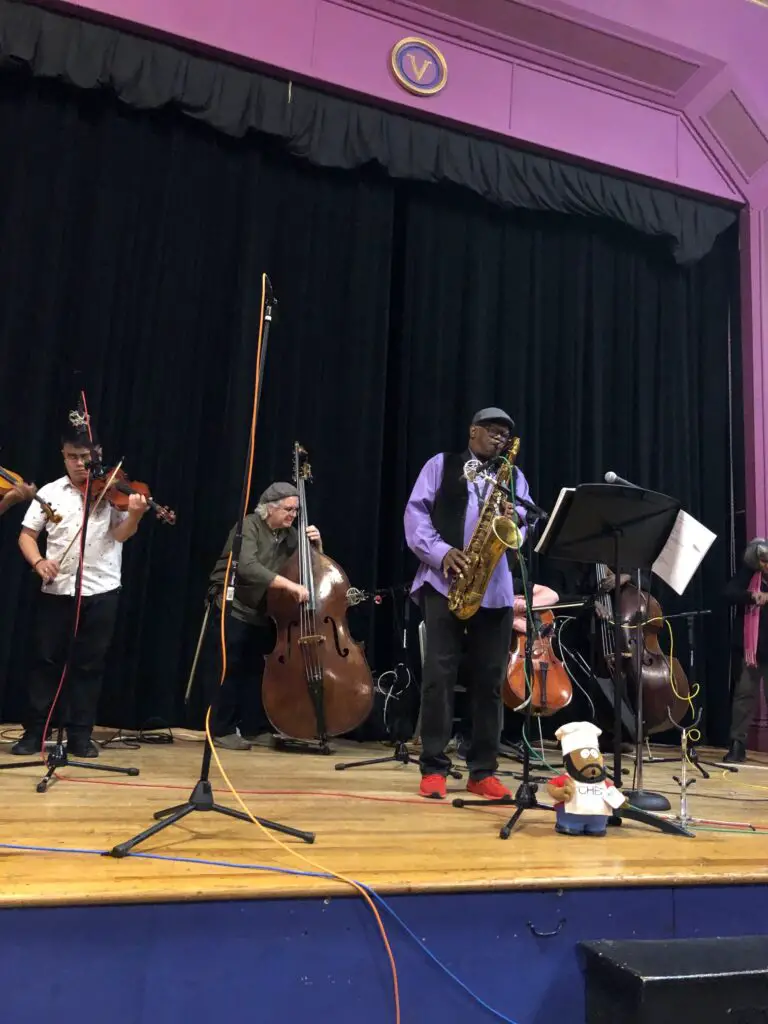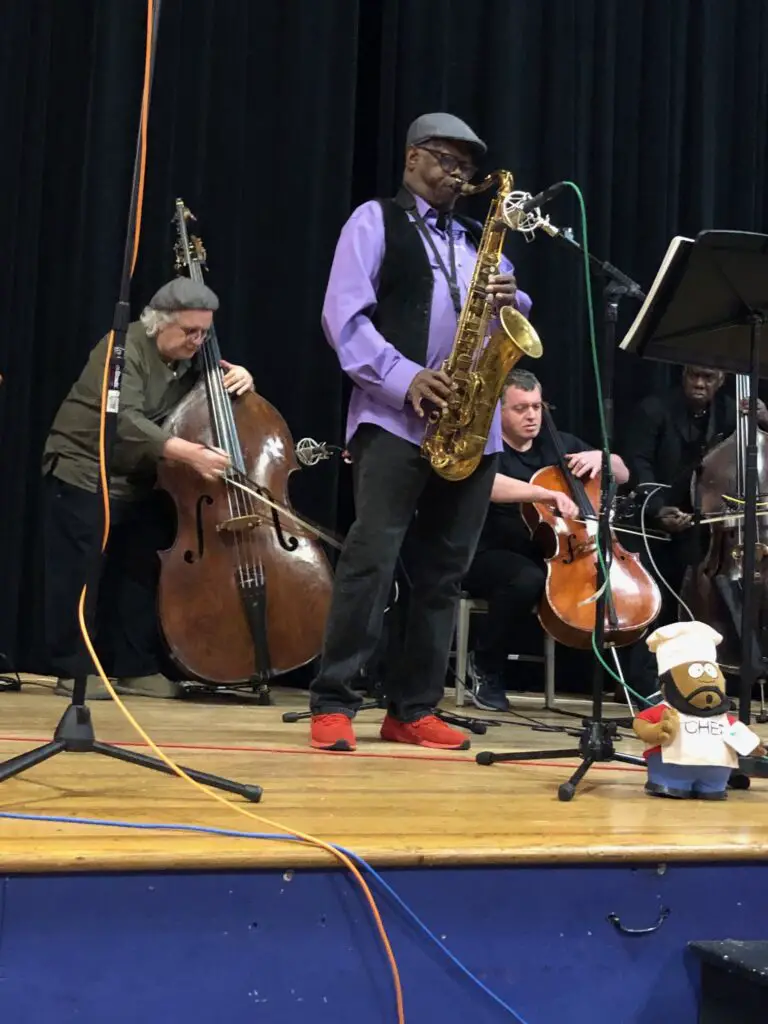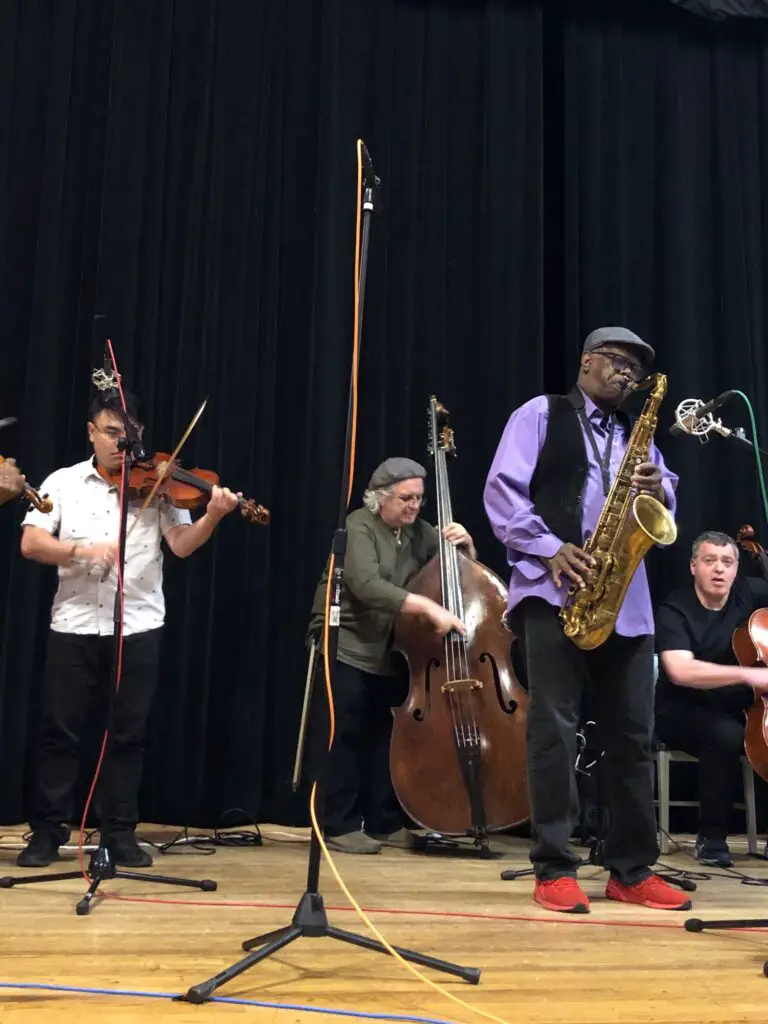In a brief preface to Saturday’s performance at VBI Theatre of Cunneen-Hackett Arts Center in Poughkeepsie, 84-year-old free jazz legend Joe McPhee told the crowd that ‘no plan was the plan’ and that those in attendance would enjoy a performance that had never happened before and would never happen again.

Alternating between saxophone soloist, spoken-word beat poet, and band conductor, McPhee held true to that promise, leading the unconventional 10-piece group in an hour of adventurous free improvisation that drew on chamber music influences and the avant-garde as much as it did on the blues.
A Poughkeepsie native who lectured on jazz at Vassar College in the early 70s, McPhee is the connective tissue to the great saxophone innovators of the past. In his poetry, he namechecked John Coltrane, Ornette Coleman, and Albert Ayler. Before the show, McPhee joked that he always backs out of playing in his hometown, but that show organizer and electric guitarist James Keepnews just kept at him until the gig was scheduled. Kudos to Keepnews for making it happen.
The ensemble featured two basses (Michael Bisio of the Matthew Shipp trio and the masterful Hilliard Greene), cellist Daniel Levin, guitarists Keepnews and Billy Stein, violists Judith Insell and late-addition Fung Chern Hwei, and violinists Rosi Hertlein and Gwen Laster. McPhee noted that he had met some of the musicians that very day and that they’d had only a brief rehearsal. In other words, in this first of the 2024 Elysium Furnace Works concert series, anything could happen.
McPhee is a commanding presence on stage. In his red Puma sneakers, cap, and stylish vest, he looked 20 years younger than his age and he did an excellent job directing the group so that everyone wasn’t stepping all over each other. McPhee’s performance was also a kind of balancing act between recounting poetry, soloing on saxophone, and directing traffic.
The performance kicked of with McPhee’s line of poetry: “The sound begins.” He cued Rosi Hertlein to accompany him and her vocalizations and technique recalled the visionary deep listening stylings of Pauline Oliveros. “The sound surrenders to itself,” recited McPhee, “and becomes the place where the meeting begins.”

As the night progressed, Joe McPhee featured small groups of musicians. Bisio, Levin, and Stein all stood out for their contributions and innovative rhythmic bowing techniques. Then at times, McPhee would call for all of the players to improvise, leading to a beautiful cacophony. Then the sound entered the stratosphere when McPhee played his horn.
McPhee’s great gift is incredibly similar to his idol Ayler: though he can play atonally, sing through the horn, or play piercing overtones, the essence of his playing is rooted in a kind of spiritual blues that is more sensitive and melodic than other percussive players. Perhaps this is why his poem and piece “New Chicago Blues” may have connected best with the audience. At one time each of the ten members of the stage was playing his or her own version of the blues – this was no 12-bar nightclub band, but an expression of deep blues and immediacy that transcended meter and time while still honoring everything a listener knows about the genre. It was powerful, wild, and rare stuff. It appeared the show was being recorded, so hopefully it will be released by McPhee in the future – but knowing his ethos, he’s probably already on to the next thing.
But it takes real talent to look forward while also recognizing your link to the past. In the course of an evening, McPhee namechecked everyone from Duke Ellington to Sun Ra to his recently departed friend Peter Brotzmann who told him in a final email that they were “same age, different color, but brothers in soul. Stay straight, old friend.” It was a humbling realization that most of McPhee’s contemporaries aren’t around anymore, and it was a reminder of what a gift it is to see him in such fine form in 2024.

McPhee originally learned the trumpet in his youth, but it was the music of Albert Ayler that inspired him to pick up the saxophone. On only his second day owning the instrument, McPhee went to a jam session at the National Cafe on Main Street, and was kicked out by all the other musicians. As he forged ahead on the free jazz scene, it took a long time for McPhee to gain acceptance, and he rarely found it in Poughkeepsie where he worked a factory job to help fund trips to Europe. There his free jazz approach was appreciated and he met such luminaries at Cecil Taylor.
Joe McPhee is currently working on a memoir with Hudson Valley author (and Elysium Furnace Works show-promoter) Mike Faloon called Straight Up, Without Wings: The Musical Flight of Joe McPhee which will be published by Corbett vs. Dempsey upon completion. In recent years labels like Corbett vs. Dempsey and Superior Viaduct have been instrumental in releasing McPhee’s new music and reissuing classic releases from the HatHut label.
For those looking to dip their toes into McPhee’s experimental music, there’s no better place to start than 1970’s Nation Time. Originally released by the Poughkeepsie independent label CjR, original copies are extremely rare and collectible in jazz vinyl circles, but reissues have revived interest in the record and are readily available. But, McPhee is hardly about mining the past – he’s always doing something new and expressing his ultimate belief that “music is love and love is music”. At 84, he still has much to say in his poetry and through his horn.


Comments are closed.